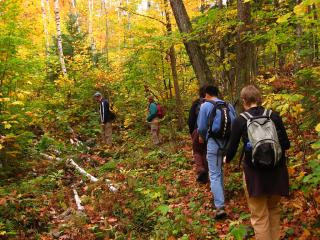I have been hearing a lot about food miles lately. While it is good for people to be aware of the productive processes that support them, I also have issues with the shape of the local foods debate. Just because something is produced closer to where you live does not mean it is more ecologically friendly or less climate harming. To take an extreme case: people living in very cold regions may find that it is far more environmentally sound to import food from warmer places than to grow it in greenhouses nearby. My focus here is on greenhouse gas emissions, but similar arguments can be made regarding water use, pesticides, etc.
What this debate really demonstrates is the lack of proper carbon pricing in the market. If CO2 emissions were included in the price of tomatoes or bananas, producers could choose to base production in whichever location is most efficient when carbon emissions (along with other factors) are taken into account. Until proper carbon pricing exists, there is justification for the intelligent application of the food miles concept. That said, I think the energy of environmentally aware people is much better spent advocating carbon taxes or cap-and-trade schemes than on encouraging people to spent their time buying local zucchini, rather than whatever sort is at the supermarket. By all means, attend farmers’ markets if you like them, but I think it is deluded to think they can make a meaningful contribution to reducing human emissions to 5,000 Mt of CO2 equivalent.
I can already feel the dissenting opinions coming on, for this post…


See also: Freight shipping and greenhouse gasses
Also:
Ethical consumerism: worthwhile or harmful?
One good thing about local food is that it helps avoid the buildup of massive hidden problems elewhere. Food industries that import masses of fertilizers, pesticides, and herbicides and then export their wastes into the water system often damage the environment in ways not easily seen.
Internalize externalities. It could even be a shirt slogan.
Anon,
There is some good sense in that. Re-localization can help make ethical questions less opaque.
Food Miles or Poverty Eradication?
The moral duty to eat African strawberries at Christmas
by Benito Müller
Director, Energy & Environment OIES, Managing Director OCP
In his latest Energy and Environment Comment, Dr Benito Müller looks at the recent controversy about discouraging consumers particularly in the UK from buying produce of least developed countries because of their ‘food miles’, i.e. the transport carbon emissions (especially from air freight), and the effect that such an environmental consumer boycott has on the efforts to eradicate poverty in these countries. He proposes a solution to the dilemma which offers a ‘double development dividend’, not only in terms of clean exports, but also in promoting much needed CDM activities in these poorest and most vulnerable countries.
Locally impoverished
By Ryan Avent
As I’ve studied green issues, I have frequently come across the “buy local” train of thought, but I’ve never seen it embraced as completely as it was in this Gristmill post by Jon Rynn — at least not since my undergraduate courses on international trade and economic philosophy. It’s very easy to understand the intellectual impulse behind his arguments, but don’t think I’m overstating the point in calling his recommendations potentially disastrous. Buying local is a common and appealing idea, so it’s worth reviewing the economics behind Rynn’s proposals…
This is bad for humanity for other reasons, too. Trade is a source of insurance. Without trade, the current drought in the American southeast would be a famine. Thousands, perhaps more, would die or become refugees. Now we could say that buying local is good, except in cases of famine, but why draw the line there? Why not say buying local is good, except in cases of hunger? Except in cases of generally poor living conditions?
UNDERSTANDING FOOD LABELS YOU MIGHT ENCOUNTER AT WHOLE FOODS.
BY G. XAVIER ROBILLARD
What Will We Eat as the Oil Runs Out?
Today, in the industrialized world, the frequency of famine that our ancestors knew and expected is hard to imagine. Food is so cheap and plentiful that obesity is a far more widespread concern than hunger. The average mega-supermarket stocks an impressive array of exotic foods from across the globe, and even staples are typically trucked or shipped from hundreds of miles away. All of this would be well and good if it were sustainable, but the fact that nearly all of this recent abundance depends on depleting, non-renewable fossil fuels whose burning emits climate-altering carbon dioxide gas means that the current situation is not sustainable. This means that it must and will come to an end.